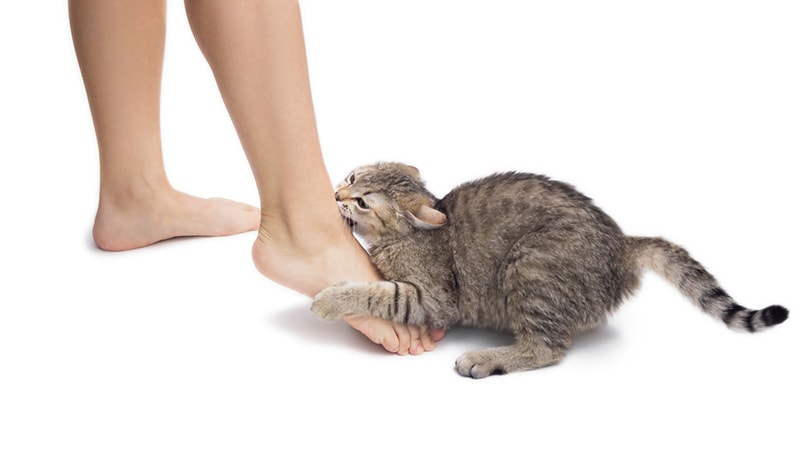Why Does My Cat Bite My Ankles: 6 Vet-Reviewed Reasons
Updated on

Click to Skip Ahead
Cats can be cute, cuddle, rambunctious, and downright crazy at times. They tend to do things on their own time, on their own account, and whether anyone else around them likes it. One example of strange behavior a cat may display is biting on the ankles. While it might seem wild to us, it’s normal behavior for cats. Read on to learn more!
The 6 Reasons Your Cat Bites Your Ankles
There are several reasons why your cat might be biting your ankles. Here are the six most common reasons and some tips for getting your feline family member to stop the behavior:
1. Predatory Behavior
Cats are naturally predatory. They want to hunt small mammals, like rats and insects, whenever possible. If they don’t have any actual prey to hunt, they might decide to hunt things like your ankles to relieve their predatory instincts.

2. Feeling Playful
Another reason your cat might bite your ankles is because they feel playful. If they wake up from a nap or have some extra energy, they might think that attacking your feet while you walk is a fun way to pass some time.
3. Seeking Attention
Some cats like to seek attention from their human companions when feeling lonely or bored. They might dart out from behind a door while you’re walking down the hallway and attack your ankle, or they might just run up and bite an ankle while you’re hanging out on the couch.

4. Boredom
If a cat does not have adequate access to toys and other activities that keep them sufficiently physically and mentally stimulated throughout the day, they are bound to get bored. Nobody should be surprised if a bored cat decides to attack and bite an ankle that happens to be walking by.
5. Stress or Anxiety
Cats that feel stressed out or anxious can display behaviors like biting a human companion’s ankles. This is their way of getting rid of that unwanted pent-up energy and not a way to attack or hurt a companion. They don’t understand the pain they are inflicting.

6. Pain or Medical Problems
A cat in pain or with a medical condition that makes them feel uneasy may end up biting a human companion’s ankle, particularly if you try to pick them up or touch an area that hurts. Their pain and discomfort may be due to issues like arthritis, injuries, or organ system disease, and their sudden aggressive behavior may be a consequence of the pain and discomfort they are experiencing.
How to Stop Your Cat From Biting Your Ankles
Luckily, there are a few things that you can do to keep your cat from biting your ankles as time goes on so that you don’t have to put up with the pain of it. There is no reason to allow your furry family member to continue biting your ankles.
- Create “Hunting” Opportunities: To relieve your cat’s instinct to hunt, you can provide them with toys that allow them to do just that. A battery-operated mouse, an old sock filled with catnip, and a feather toy you control are all awesome options. Always supervise your cat during playtime so they do not try to swallow any of their toys.
- Increase Stimulation Opportunities: Switch your cat’s toys out often so they always have some variety throughout the week. Add new hanging toys to their scratching posts and utilize puzzle-treat toys to increase their opportunity to stimulate their brain and body when you’re not there to interact with and challenge them.
- Create Some Outdoor Space: If you keep your cat indoors to minimize the risk of disease and danger, your cat might be itching to get out there and experience nature. If possible, secure and enclose a porch or set up a safe outdoor catio so your cat can get outside and lay in the sun, as well as sniff all the nature around your home or apartment while staying safe.
- Visit Your Veterinarian: If you can’t figure out why your cat is biting your ankles, even if they don’t show any other signs of pain or health problems, it is important to get to a veterinarian for a complete checkup and some necessary testing.
Conclusion
Cats might bite their human companions’ ankles for various reasons. Figuring out why your cat is chasing and biting your ankles will help you better understand what you can do to stop the behavior. Try all the options on our list, and don’t forget to consult with your veterinarian for expert guidance and advice.
Featured Image Credit: Marina Demeshko, Shutterstock













